In the world of real estate, there are so many terms and phrases it can boggle the mind. 🤯 And agents tend to use a lot of “Realtor Speak” when communicating with clients.
We can’t help it. After so many years in the business, it’s just how we think and communicate with other professionals in the industry.
So forgive us for using our whacky terminology on you! To help out, below you will find many commonly used terms and real estate related definitions.
But if things aren’t clear or you still need answers to your questions, just reach out and we’ll be happy to help!
Welcome!
Welcome to our Frequently Asked Real Estate Questions page! Here you will find answers to some of the most common questions about buying and selling real estate.
Whether you are a first-time homebuyer or a seasoned investor, we have compiled a list of questions that can help you in your real estate journey.
Our goal is to provide you with the information you need to make informed decisions about your property.
If you have any additional questions, please don’t hesitate to contact us for more assistance. We look forward to helping you find the right property for your needs. Thank you for visiting!
Buying and Selling Real Estate
Are you looking to buy or sell a home?
If so, you may have a lot of questions about the real estate process. From finding the right property to understanding the paperwork involved, it can be overwhelming to navigate the real estate market.
To help make things easier, we’ve compiled a list of some of the most frequently asked real estate questions.
Whether you’re a first-time homebuyer or an experienced investor, these answers can help you get started on your real estate journey.
1. How do I find the right property for me?
The first step in finding the right property for you is to determine your budget and needs.
Consider the size of the home, location, and any special features you may want.
Once you have a better idea of what you’re looking for, start researching properties in your area.
You can search online, or contact a real estate agent for assistance.
2. What documents do I need to buy a home?
When buying a home, you’ll need to provide a few documents to your lender.
These include proof of income, bank statements, tax returns, and more.
Your lender will also require you to sign a purchase agreement, which outlines the terms of the sale.
Make sure to read through your purchase agreement carefully and ask questions if you don’t understand any of the language.
3. What is the process of selling a home?
Selling a home involves a few steps. First, you’ll need to list your property on the market and wait for offers.
Once you receive an offer, you’ll need to negotiate the terms with the buyer and sign a contract.
You’ll also need to complete the necessary paperwork and prepare the home for inspection.
After the inspection and appraisal are completed, you’ll need to close the sale and transfer the title.
4. What is the difference between renting and leasing?
The main difference between renting and leasing is the length of the agreement.
Renting typically requires a month-to-month agreement, while a lease is usually for a set period of time.
Renters are typically responsible for maintenance and repairs, while a landlord is usually responsible for these costs with a lease.
We hope this list of frequently asked real estate questions will be helpful as you navigate the real estate market.
If you have any additional questions, please contact a real estate professional for assistance.
Find the answers to your most asked questions about real estate. Click on the big + button to view the answer.
Financing
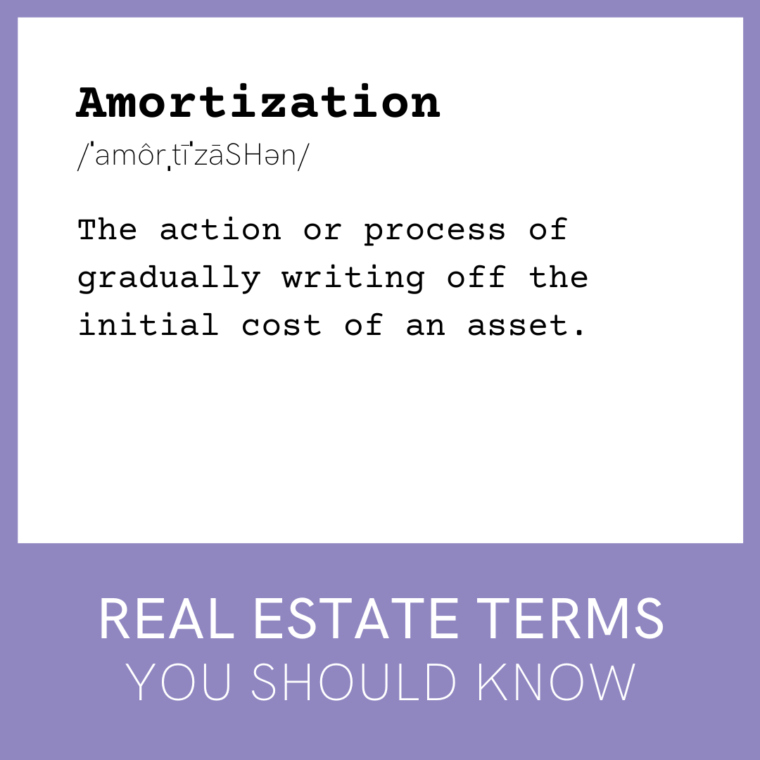
What is Amortization?
The action or process of gradually writing off the initial cost of an asset.
Do you know what kind of mortgage you have? Do you know whether your payments are going to increase over time? 📈
“Amortization” is the term used for the schedule of mortgage installment payments over a period of time. Typically, a buyer’s amortization schedule is one payment per month over 15 or 30 years.
📢 Important:
📝 There are both adjustable and fixed-rate mortgages. With an adjustable rate, the lender can increase the rate on a predetermined schedule, which would impact your amortization schedule.
📝 With a fixed rate, your payments with remain the same for the life of the loan, unless you refinance or there are changes to taxes or insurance.
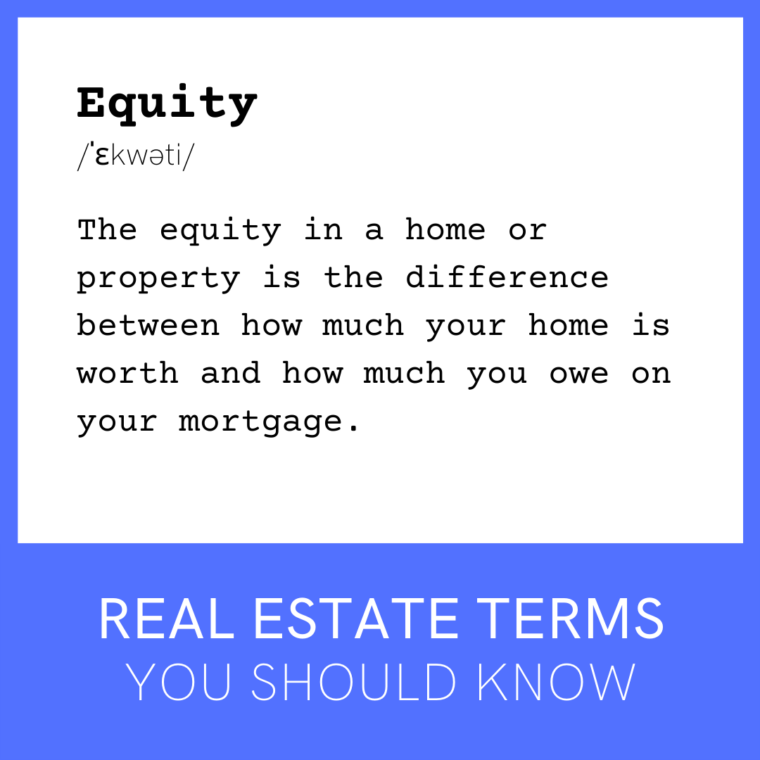
The equity in a home or property is the difference between how much your home is worth and how much you owe on your mortgage.
So if your home is worth $500,000 and you owe $450,000 on your mortgage, your equity in the home is $50,000.
See also home equity line of credit.
Leave a Reply
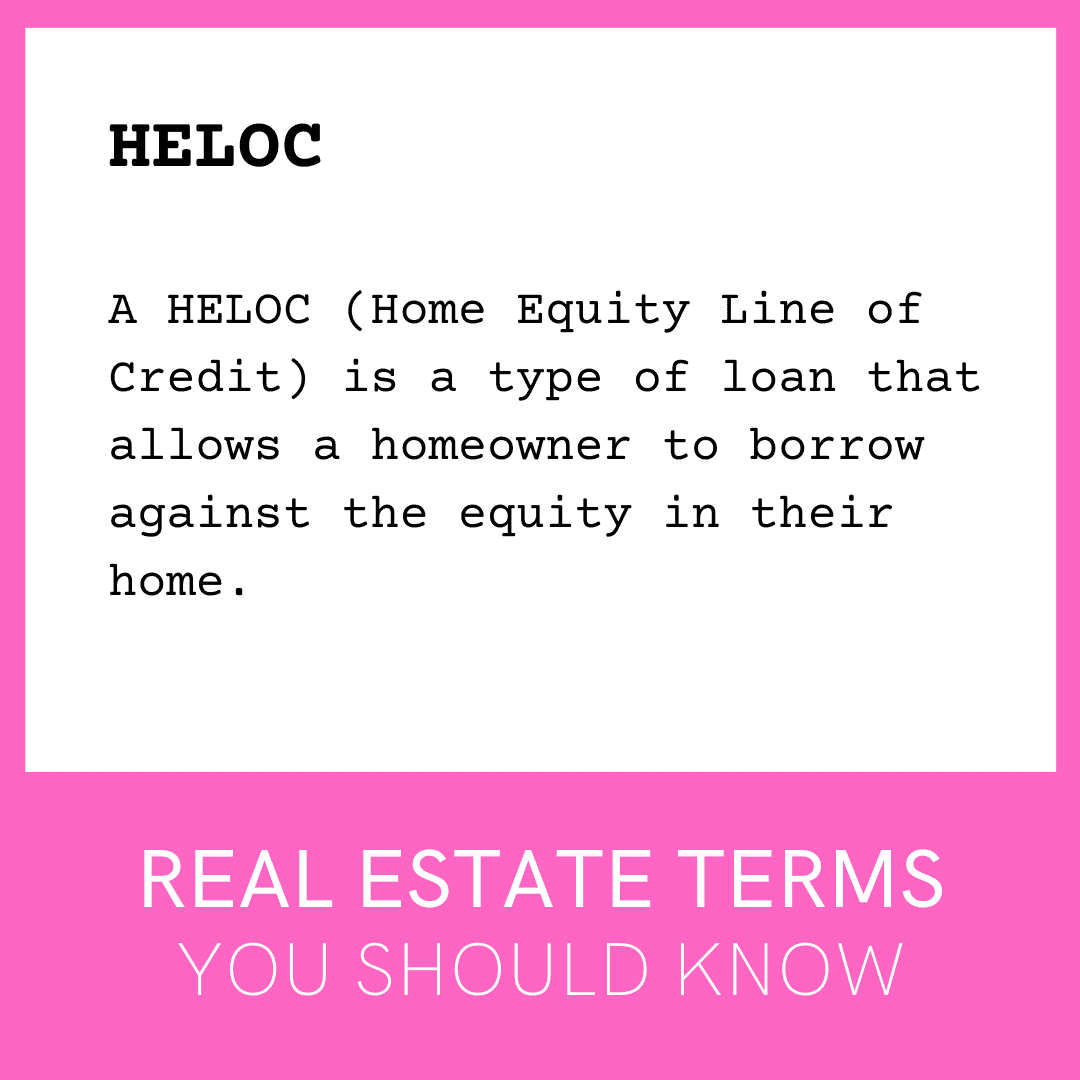
What is a HELOC?
A HELOC (Home Equity Line of Credit) is a type of loan that allows a homeowner to borrow against the equity in their home.
The borrower can use the money for whatever they choose and the interest rate is usually lower than other types of loans.
The loan is secured by the home, so if the borrower can’t make payments, the lender can take the house.
Sometimes a Home Equity Loan is a better choice for the borrower. Talk to your lender to find out more.
Leave a Reply
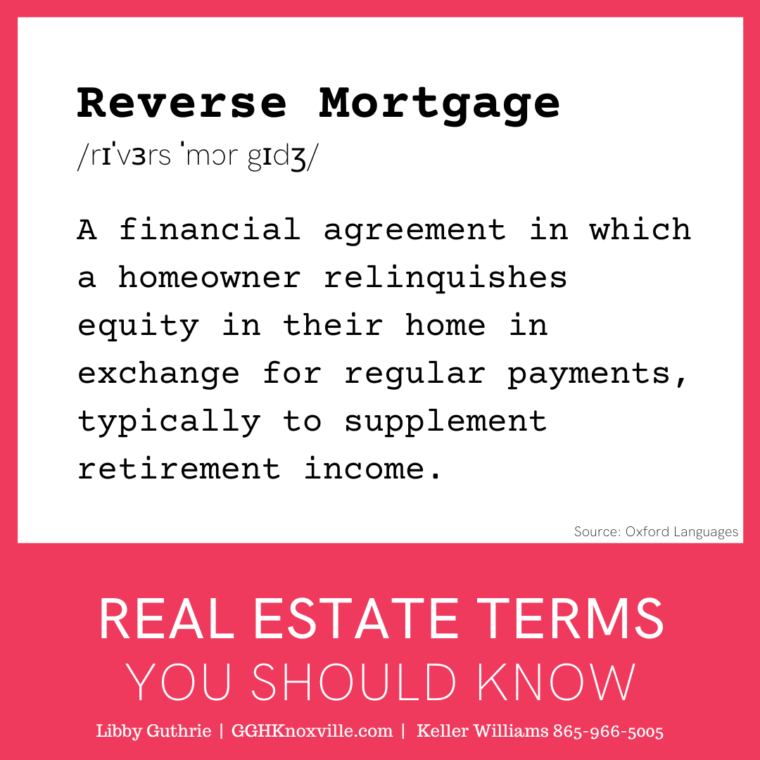
What is a Reverse Mortgage?
A financial agreement in which a homeowner relinquishes equity in their home in exchange for regular payments, typically to supplement retirement income. This type of loan is for seniors ages 62 and older.
Should you get a reverse mortgage?
While it can be a great way to supplement your retirement income, there are some things to watch out for:
⚠️ High fees
To get and finalize your reverse mortgage, you’ll be paying a range of fees that can add up quickly.
⚠️ Variable or high-interest rate
The interest rate is often higher than that of a standard mortgage. It may also be variable, rather than fixed, which means it can increase in the future.
⚠️ Less money for your heirs
The remaining amount of your estate will need to be repaid when you’re no longer here, usually in a specific period of time, which can be costly and stressful for your family.
This is why, in some cases, downsizing can be a better option. If you’re deciding between the two, contact us to discuss your options and make the best choice for your needs.
Leave a Reply
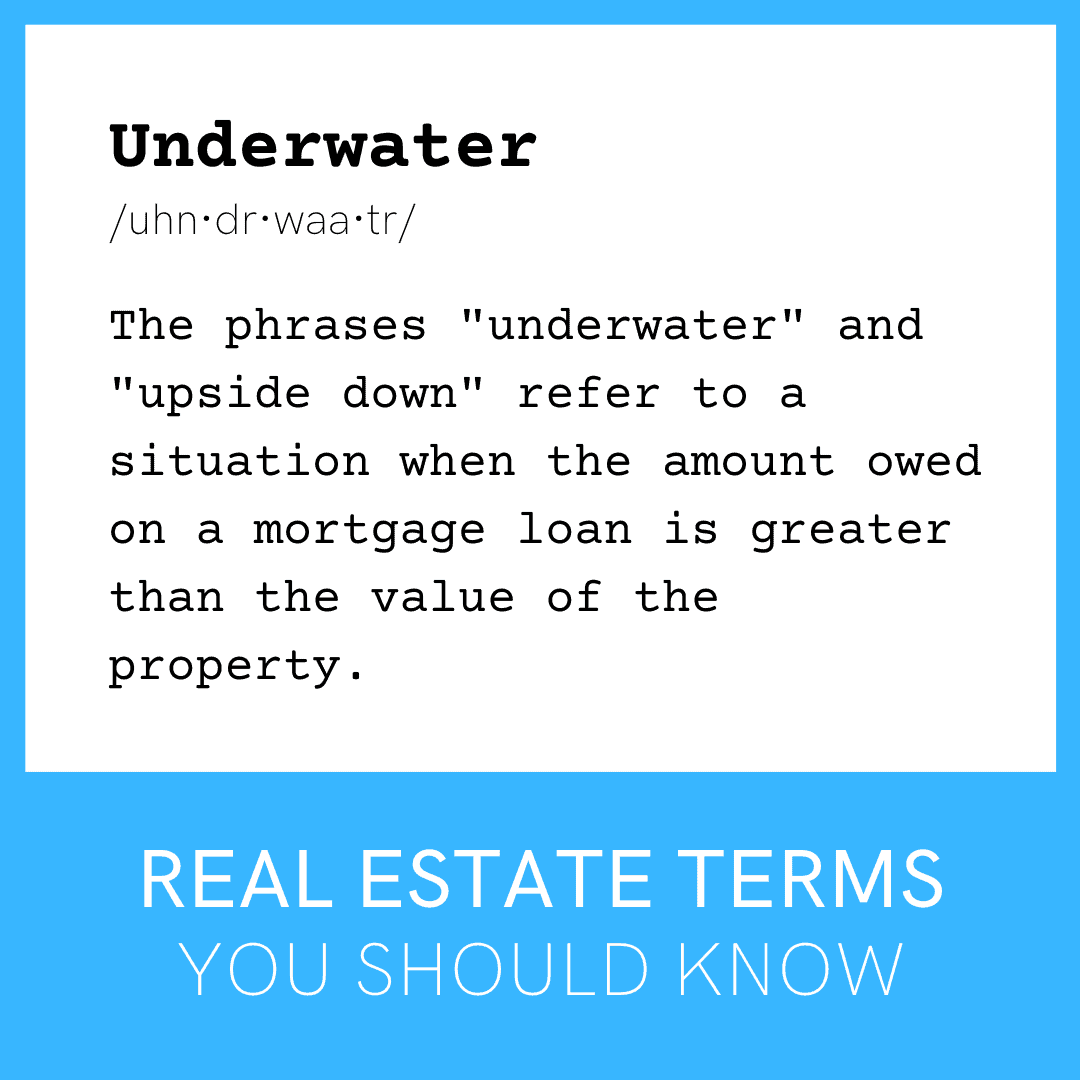
What does it mean when you are Underwater?
The phrases “underwater” and “upside down” refer to a situation when the amount owed on a mortgage loan is greater than the value of the property.
In simpler terms, a house is underwater when the owner owes more on the mortgage than the house is worth.
You have various options on what to do if you are in this situation.
Leave a Reply
Home Buyers
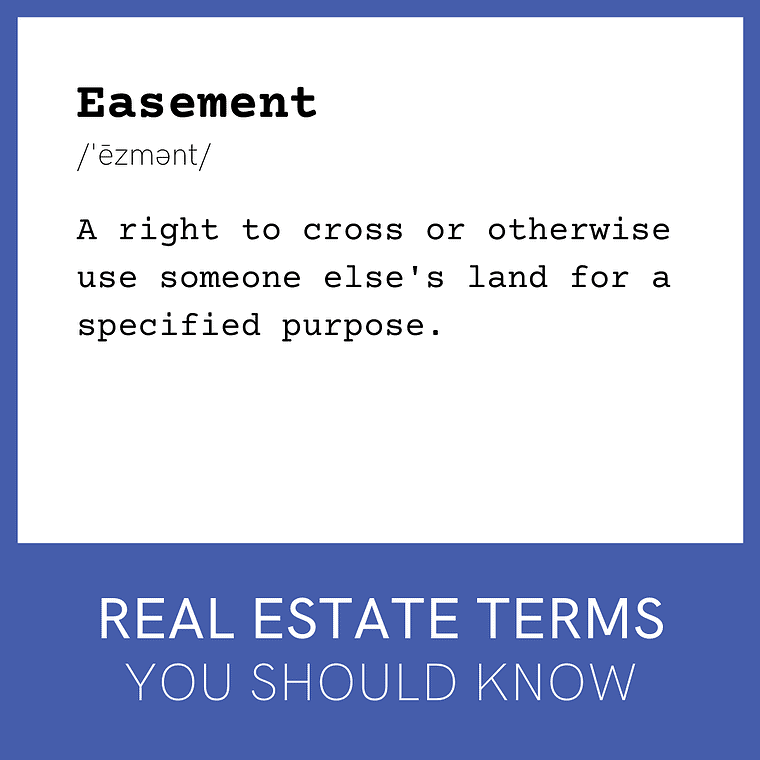
What is an easement? 🔎🏡
A right to cross or otherwise use someone else’s land for a specified purpose.
The term often crops up after buyers have made an offer on a home that’s been accepted, at which point a title search brings up the easement—which is essentially the legal right for someone else to use the property, or part of the property for a specific purpose.
Say what? You bend over backward to buy a home and now you have to share?! Don’t worry, in most cases, it’s not as bad as it sounds.
Types of Easements:
📝 Right of way: This is where a neighbor may need to pass through the property via a driveway to access the main road, a neighborhood playground, or a community feature (like a lake).
📝 Utility maintenance: This easement is typically granted to utility companies to run power and cable lines on a property.
📝 HOAs/condos: If you live in a condo or home managed by a homeowners association, odds are these institutions own much of the property—while residents have rights to pass through.
Leave a Reply
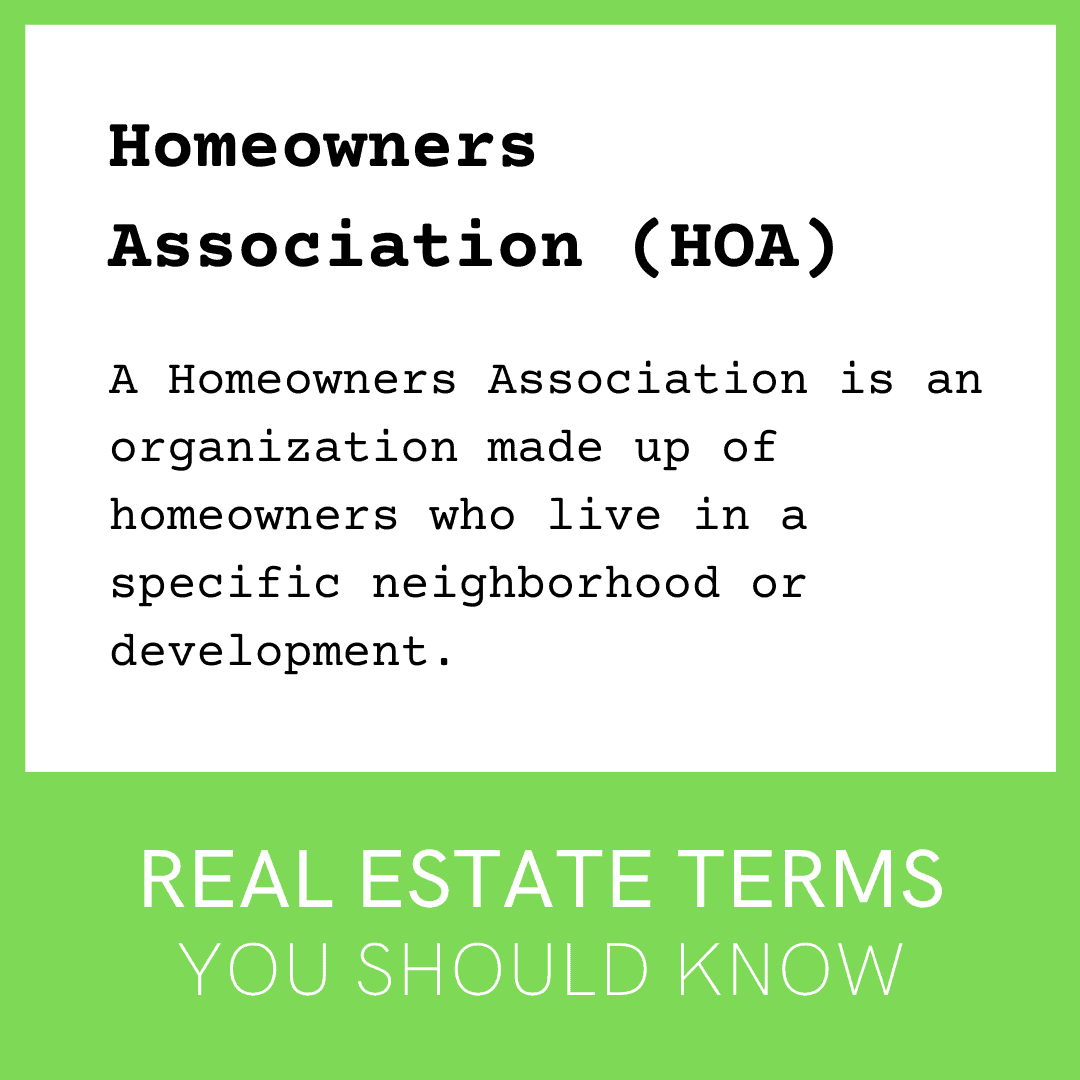
What is a Homeowners Association (HOA)?
A private organization that is often formed by a real estate developer to manage homes and lots in a residential subdivision.
A Homeowners Association (HOA) is an organization made up of homeowners who live in a specific neighborhood or development.
The HOA is responsible for managing and maintaining the common areas of the neighborhood, such as parks and playgrounds.
They may also have rules in place that all homeowners must follow, such as restrictions on landscaping or noise levels.
Leave a Reply
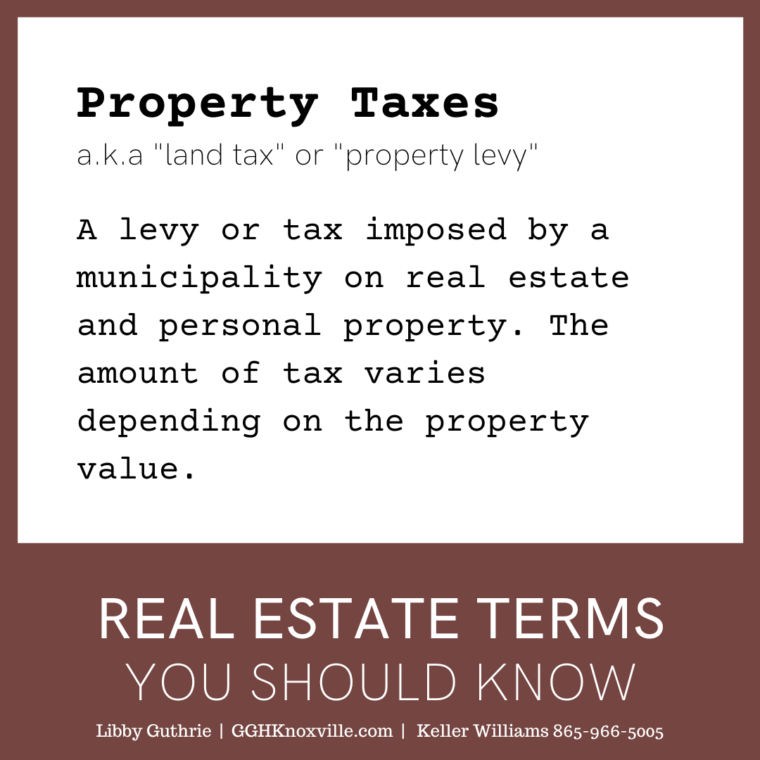
What are Property Taxes?
A levy or tax imposed by a municipality on real estate and personal property. The amount of tax varies depending on the property value.
Property taxes are an annual tax that local municipalities collect each year, based on the assessed value of your property (not on the appraised value of your home). These funds help pay for services that benefit the community, such as schools, roads, maintenance, etc.
First-time homeowners often forget to factor property taxes into the overall cost of their new home, which can come as a nasty shock come tax season. So let this be a reminder to all homeowners to calculate property taxes into their annual budget!

Leave a Reply

What is the Title of a house or property?
Title (aka Title Deed) refers to the legal document that shows the history of ownership and transfers of property – proving you are the current and rightful owner of the property.
A title, also known as a title deed, is a document that shows who owns a piece of property.
When someone buys a house, they get a title deed that shows they are the owners.
The title deed has the names of the people who bought the house and is signed and notarized so it is legally valid.
Leave a Reply
Home Sellers

What are Property Taxes?
A levy or tax imposed by a municipality on real estate and personal property. The amount of tax varies depending on the property value.
Property taxes are an annual tax that local municipalities collect each year, based on the assessed value of your property (not on the appraised value of your home). These funds help pay for services that benefit the community, such as schools, roads, maintenance, etc.
First-time homeowners often forget to factor property taxes into the overall cost of their new home, which can come as a nasty shock come tax season. So let this be a reminder to all homeowners to calculate property taxes into their annual budget!

Leave a Reply
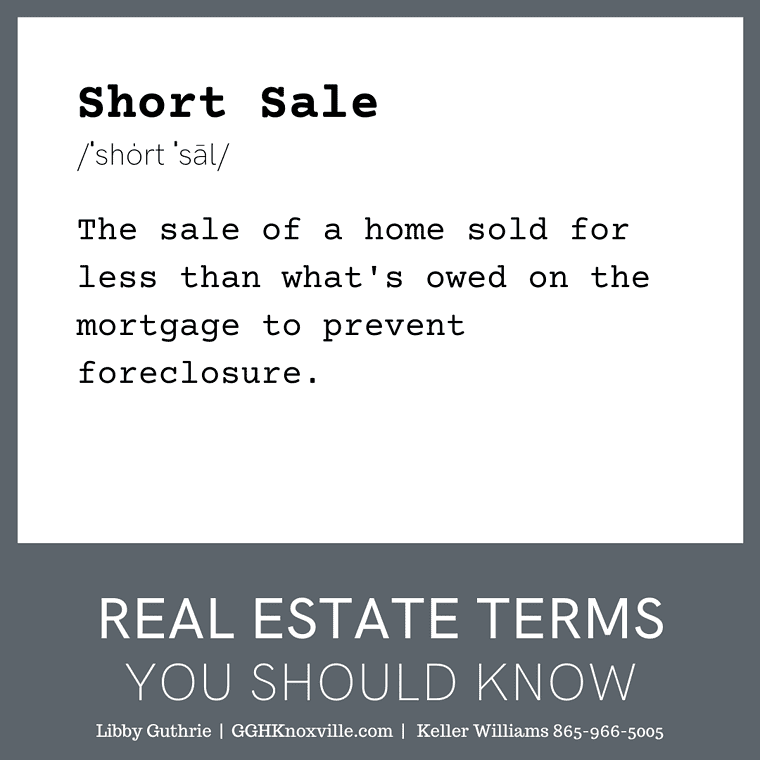
A “short sale” is a home sold at a discounted price. But why would someone want to sell their home for less than it’s worth? 🤔
Homeowners struggling to make payments on their mortgage are faced with the option to foreclose on their property, which can severely damage their credit.
But a short sale can leave less of a negative impact, and some sellers can qualify for other home loans once the short sale closes.
If you’d like to learn more about short sales in our area (how they work, if they’re in your best interest, or how to take advantage of them if you’re a buyer), send us a message 📲
Leave a Reply

What does it mean when you are Underwater?
The phrases “underwater” and “upside down” refer to a situation when the amount owed on a mortgage loan is greater than the value of the property.
In simpler terms, a house is underwater when the owner owes more on the mortgage than the house is worth.
You have various options on what to do if you are in this situation.





Leave a Reply